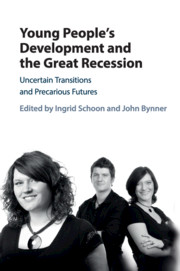Book contents
- Frontmatter
- Contents
- List of Figures
- List of Tables
- Contributors
- Acknowledgments
- Preface
- List of Abbreviations
- Part I Introduction
- Part II The Changing Context of Youth Transitions
- Part III Variations in Education and Employment Transitions during Times of Economic Hardship
- Part IV The Impact of the Great Recession on Families
- Part V Future Orientations and Well-being
- 13 Economic Recession and Youth Achievement Orientations
- 14 The Recession, Young People, and Their Relationship with the Future
- 15 The Impact of the Recession on Young People's Satisfaction with Democratic Politics
- 16 The Great Recession, Health, and Health Inequalities in Adolescents in North America, Europe, and Israel
- 17 Impact of the Great Recession on Young Adult Health: The Significance of Social Class
- Part VI Conclusion
- Index
- References
16 - The Great Recession, Health, and Health Inequalities in Adolescents in North America, Europe, and Israel
from Part V - Future Orientations and Well-being
Published online by Cambridge University Press: 20 October 2017
- Frontmatter
- Contents
- List of Figures
- List of Tables
- Contributors
- Acknowledgments
- Preface
- List of Abbreviations
- Part I Introduction
- Part II The Changing Context of Youth Transitions
- Part III Variations in Education and Employment Transitions during Times of Economic Hardship
- Part IV The Impact of the Great Recession on Families
- Part V Future Orientations and Well-being
- 13 Economic Recession and Youth Achievement Orientations
- 14 The Recession, Young People, and Their Relationship with the Future
- 15 The Impact of the Recession on Young People's Satisfaction with Democratic Politics
- 16 The Great Recession, Health, and Health Inequalities in Adolescents in North America, Europe, and Israel
- 17 Impact of the Great Recession on Young Adult Health: The Significance of Social Class
- Part VI Conclusion
- Index
- References
Summary
Abstract
The recent economic recession, documented to have lasted from December 2007 to June 2009 and labeled as the “Great Recession,” has affected prospects for financial security and health among populations of many countries. Recent research about the health impacts of the Great Recession has predominantly focused on adults. This chapter explores the extent to which the Great Recession relates to changes in health and socioeconomic health inequalities in adolescents (aged 11 to 15 years) in Europe, North America, and Israel. Using data from the Health Behaviour in School-aged Children (HBSC) study that were collected before the onset of the recent recession (in 2005/2006) and a few years after it began (in 2009/2010), we found that changes in both national prevalence rates and socioeconomic inequalities in psychological health complaints were mostly modest during the Great Recession. Moreover, the effects of the Great Recession, indicated by change rates in youth and adult unemployment between 2005/2006 and 2009/2010, did not significantly correlate to psychological health complaints and socioeconomic inequalities in psychological health complaints. From a cross-national perspective, health and socioeconomic health inequalities in adolescence appear to have been unaffected by the Great Recession.
Introduction
The recent economic recession, documented to have lasted from December 2007 to June 2009 and labeled as “Great Recession,” has affected prospects for financial security and health among populations of many countries. Like economic downturns in the past, the recent recession threatens living conditions and individual well-being through the anticipated and actual losses of economic and social security (Burgard, Ailshire, and Kalousova 2013; Catalano et al. 2011; Karanikolos et al. 2013; Modreck et al. 2013; Stuckler and Basu 2013; Suhrcke and Stuckler 2012). A number of studies on adults have found detrimental impacts of the recent recession on mental and physical health as well as on different health behaviors. Its onset in 2007 was accompanied by a rise in suicides in Greece (Economou et al. 2011), Italy (De Vogli, Marmot, and Stuckler 2013a, 2013b; De Vogli, Vieno, and Lenzi 2014; Pompili et al. 2014), Spain (López Bernal et al. 2013), the United Kingdom (Barr et al. 2012), the United States (Reeves et al. 2012), and across Europe (Karanikolos et al. 2013; Reeves, McKee, and Stuckler 2014; Stuckler et al. 2009) and the world (Chang et al. 2013).
- Type
- Chapter
- Information
- Young People's Development and the Great RecessionUncertain Transitions and Precarious Futures, pp. 401 - 424Publisher: Cambridge University PressPrint publication year: 2017
References
- 2
- Cited by



